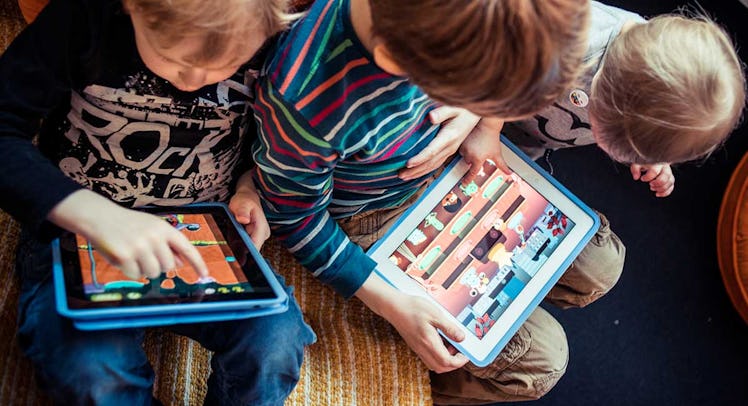The Best 7 Kid Games That Increase Emotional Intelligence & Get Kids To Understand Feelings
Feelin' good.

Kids are thoughtful, caring creatures. Or, at least they will be. In the beginning, they’re confused little things who have a hard time understanding concepts like sharing, compassion … or facial expression. Basically, toddlers and preschoolers are little emotional tuning forks that need to be calibrated. You’re already teaching them the ins and outs of understanding, but a little reinforcement won’t hurt. Here are kids games that are fun and inform their emotional intelligence, because it’s tough to navigate this thing called life.
Sharing With Duckie Deck
As the name explicitly suggests, it’s a smartphone app that teaches your kid to share. With a duck. There are six available games that boost their memory, matching, and hand-eye coordination. They can dole out digital watermelon wedges and apple slices to their animal buddies, but you need to be the one to remind them they “don’t make friends with salad.”
$3 (iOS) Ages: 3+
Daniel Tiger’s Grr-ific Feelings
Their favorite cat in a sweater lets your kid explore emotions like fear, frustration, and disappointment — mostly when you take the phone from their hands. There are emotional intelligence games like “The Drawing Easel,” where they can create pictures that represent their feelings, the “Feelings Photo Booth,” where they can identify DT friends like Katerina frowning (or O the Owl making his “O” face) and snap a photo of themselves expressing the emotion … no duck faces allowed.
Toca Pet Doctor
It’s like an app version of Operation, except instead of an anatomically incorrect guy whose funny bone is acting up, there are animals your kid can patch up. Toca Pet asks them to bandage pets and show a little bedside manner, all in service of showing them about how others feel and demonstrating emotional intelligence. And, if your kid stop swinging the cat by its tail — bonus!
$2 (iOS) (Android) Ages: 2 – 6
Avokiddo Emotions
Play dress up with a variety of wonderfully animated characters with different personalities: from giggling giraffe to a shy sheep. There are more than 100 outfits and props to choose from (disco sheep, anyone?), each one coaxing a different response. It also lets kids practice important skills like facial and body language recognition. Soon they’ll know when it is (and isn’t) wig time.
Touch + Learn Emotions
Consider this one an intro to emotional intelligence. The premise is simple: 4 images of real people appear on screen, and your kid gets directions like “point at the happy teenager,” or something more realistic. Then they tap the image of that person for a correct match. The name of the game here is emotional intuition.
$2 (iOS) Ages: 3 – 5
My DPS
Digital Problem Solver — it’s like a GPS, but for emotional intelligence. This database is a bunch of tricks for kids to relate to emotions and gives them coping strategies to handle them. Characters represent 8 different feelings. When a kid pulls up a particular feeling, the app provides them a solution for dealing with it, like taking a deep breath, thought exercises, or writing Facebook comments on an unrelated news post.
Peek-A-Zoo
This award-winning interactive game is more than just farm animals dancing, wagging their tails, and wearing sunglasses. It also tasks kids with picking the critter performing the activity. The ID process slyly teaches your toddler about both animals and emotions by asking them to name the “thoughtful cow” or “pensive dog.” Actually, that last one may be a yoga move you just invented.
Free (iOS) Ages 3+
This article was originally published on